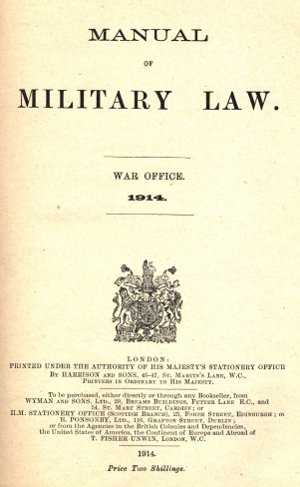Topic: Discipline
Manual of Military Law (1914)
 Army Act – Discipline (Crimes and Punishments)
Army Act – Discipline (Crimes and Punishments)
Offenses punishable more severely on active service than at other times.
6. (1) Every person subject to military law who commits any of the following offences, that is to say,
(a.) Leaves his commanding officer to go in search of plunder; or
(b.) Without orders, from his superior officer, leaves his guard, picquet, patrol, or post; or
(c.) Forces a safeguard; or
(d.) Forces or strikes a soldier when acting as sentinel; or
(e.) Impedes the provost-marshal, or any assistant provost-marshal, or any officer or non-commissioned officer, or other person legally exercising authority under or on behalf of the provost-marshal, or, when call on, refuses to assist in the execution of his duty the provost-marshal, assistant provost-marshal, or any such officer or non-commissioned officer, or other person; or
(f.) Does violence to any person bringing provisions or supplies to the forces; or commits any offence against the property or person of any inhabitant of or resident in the country in which he is serving; or
(g.) Breaks into any house or other place in search of plunder; or
(h.) By discharging firearms, drawing swords, beating drums, making signals, using words, or by any means whatever, intentionally occasions false alarms in action, on the march, in the field or elsewhere; or
(i.) Treacherously makes known the parole, watchword, or countersign, to any person not entitled to receive it, or treacherously gives a parole, watchword, or countersign different from what he received; or
(j.) Irregularly detains or appropriates to his own corps, battalion, or detachment any provisions or supplies proceeding to the forces, contrary to any orders issued in that respect; or
(k.) Being a soldier acting as sentinel, commits any of the following offences; that is to say,
(i) sleeps or is drunk at his post; or
(ii) leaves his post before he is regularly relieved,
shall, on conviction by court-martial,
if he commits any such offence on active service, be liable to suffer death, or such less punishment as is in this Act mentioned; and
if he commits any such offence not on active service, be liable, if an officer, to be cashiered, or to suffer less punishment as is in this Act mentioned, and if a soldier, to suffer imprisonment, or such less punishment as is in this Act mentioned.
(2) Every person subject to military law who commits any of the following offences (that is to say),
(a.) By discharging firearms, drawing swords, beating drums, making signals, using words, or by any means whatever, negligently occasions false alarms in action, on the march, in the field or elsewhere; or
(b.) Makes known the parole, watchword, or countersign, to any person not entitled to receive it; or, without good and sufficient cause, gives a parole, watchword, or countersign different from what he received,
shall on conviction by court-martial be liable, if an officer, to be cashiered, or to suffer less punishment as is in this Act mentioned, and if a soldier, to suffer imprisonment, or such less punishment as is in this Act mentioned.
Selected Notes:
1. Subs. (1) The punishment for the offences here mentioned varies very widely according as the offences are committed on active service or not on active service; and where a man is charged with committing any of them on acive service, those words must always be inserted in the charge. For the definition of active service, see section 180(1).
2. (a.) This paragraph, having regard to the special military significance of the term "plunder," is applicable only to offences committed on active service.
4. (c.) Safeguard. A safeguard is a party of soldiers detached for the protection of some person or persons, or of a particular village, mansion, or other property. A single sentry posted from such party is still part of the safeguard, and it is as criminal to force him by breaking into the home, cellar, or other property under his especial care as to force the whole party.
